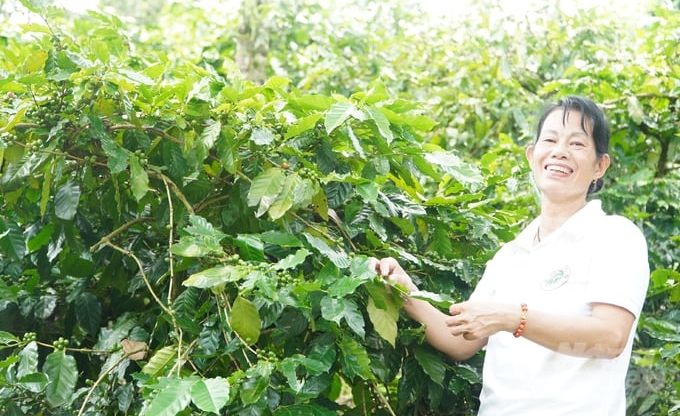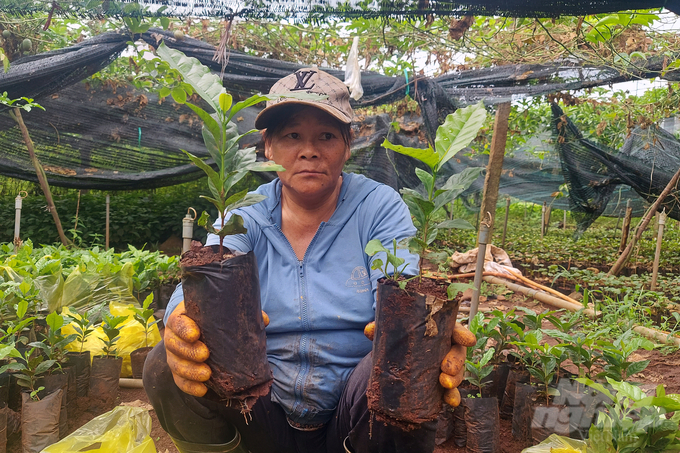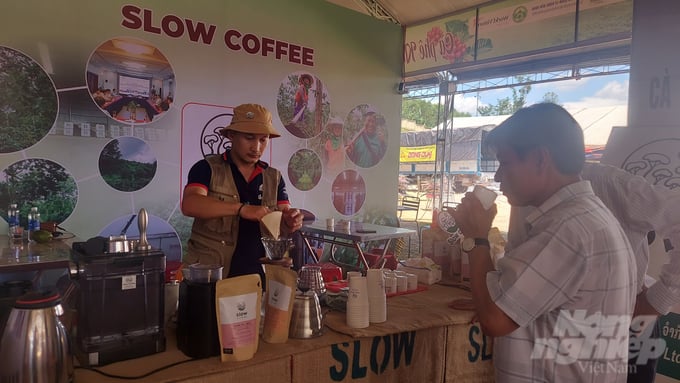November 26, 2025 | 17:36 GMT +7
November 26, 2025 | 17:36 GMT +7
Hotline: 0913.378.918
November 26, 2025 | 17:36 GMT +7
Hotline: 0913.378.918

Coffee is one of the main crops in Quang Tri, with an area of over 3.7 thousand hectares and an output of 4.4 thousand tons/year. Photo: Vo Dung.
Coffee is the main crop in Quang Tri province. However, coffee prices have been low for a long time, and many coffee areas here have been converted to other crops. Some places are "abandoned", old, and devastated. Thanks to the replanting program and warming prices, coffee gardens in Quang Tri have been revived in recent years.
Mr. Nguyen Duy Phuong, a coffee grower in Huong Phung commune, said that in recent years, encouraged by local authorities and businesses, some families have switched from traditional farming to chemical fertilizers to organic, natural farming methods to export. Many coffee gardens are planted with shade trees and use organic fertilizers and microbial products. Some businesses in the area are willing to purchase coffee grown organically and naturally at prices higher than the market ceiling price.
After cutting down old coffee roots, Mr. Phuong's family also organically planted 2 hectares of coffee. In the middle of the coffee garden, Mr. Phuong grew durian as a shade tree for an additional income source.
According to Mr. Phuong, the difficulty for coffee growers is that they do not understand the process of growing organic coffee. Uncertain coffee prices also put clean and specialty coffee growers in trouble. Therefore, people are not interested when some businesses raise the issue of linking organic and specialty coffee growing.

Quality must be built from the origin to processing and marketing to increase coffee export output to improve value gradually. Photo: Vo Dung.
"In Huong Phung, the area planted organically is currently not much. People currently do not have the conditions to grow coffee to meet export needs. That will lead to low value from coffee trees," Mr. Phuong said.
Another thing is that in Quang Tri, there is currently no business strong enough to become a big partner of farmers. Ms. Nguyen Thi Thao, owner of a coffee purchasing and processing facility in Cop Village, Huong Phung commune, said that at times, Huong Hoa district alone had up to 20 coffee purchasing and processing facility owners. Still, now there are only 6-7 units in operation. There is almost no connection between these facilities and the people. Farmers, because of their strength, do their own thing. There are times when businesses do not have enough purchasing and processing output, especially high-quality coffee.
According to Ms. Thao, more support policies are needed for local businesses to grow and increase export output. We must create stable, quality raw material areas to improve coffee tree quality gradually. Farmers not only access policies through coffee replanting programs but also need capital support for basic, long-term investments.
Quang Tri currently has over 3.7 thousand hectares of coffee, mainly Arabica coffee, most concentrated in Huong Hoa district, including 145 hectares of specialty coffee. Despite having an annual coffee output of 4.4 thousand tons, this locality only exports over 100 tons/year, mainly through Slow Coffee Company. The remaining amount is consumed domestically, so the value is low, and coffee growers still face difficulties.
Ms. Nguyen Hong Phuong, Deputy Director of the Department of Agriculture and Rural Development of Quang Tri, said coffee productivity and quality are still low. The area growing coffee certified according to export standards is still limited. The connection between businesses and people in raw material areas is not sustainable or much. In the area, no businesses are strong enough to invest in science and technology for deep processing synchronously, create products with high added value, develop brands, and export.

Through Slow Coffee Company, coffee export output in Quang Tri province is only about 100 tons/year. Photo: Vo Dung.
According to Mrs. Phuong, to increase production output, the coffee industry still has a lot of work to do. Coffee processing enterprises must restructure towards linkages to create raw material areas that meet world quality standards. Farmers need to comply and commit to adequately implementing signed contracts. In coffee-growing localities, people need to link farmers together in cooperative groups and hobby clubs... to do business together and share experiences in production.
Governments, businesses, and people work together
"State agencies and authorities at all levels need to plan stable production areas and have preferential policies for businesses to invest in innovating processing technology. People must access and apply technical advances, especially biotechnology, in production. The government accompanies people and businesses to build brands and seek to expand markets to find outlets for their products. Only then will coffee export output in Quang Tri be increased," said Mrs. Nguyen Hong Phuong, Deputy Director of the Quang Tri Department of Agriculture and Rural Development.
Translated by Tuan Huy

(VAN) China’s cooking oil is suddenly flooding into India. It all comes down to a soybean surplus that Beijing doesn’t quite know what to do with.

(VAN) An Giang promotes supply-demand connections, standardizes quality and builds value chains, creating a foundation for sustainable bird’s nest development and aiming to expand exports.
/2025/11/24/5339-4-nongnghiep-075331.jpg)
(VAN) Recently, the conference on 'Sustainable Fisheries Linkage Chain - Tilapia for Export' took place in Tien Hai commune, Hung Yen province.
/2025/11/21/4309-2-153400_128.jpg)
(VAN) Green and low-emission rice is paving the way for Vietnamese rice to enter high-end markets, marking the beginning of a transformation journey toward greening and elevating the national rice brand.

(VAN) ‘Right to Win’ outlines a national action plan that shapes a new vision for Viet Nam’s agriculture in an era of renewal and global integration.

(VAN) Lam Dong’s farmed sturgeon output this year is expected to reach 2,300 tons, worth VND 450 billion, affirming the brand’s position on the market.

(VAN) A surge in Ukrainian egg exports, largely driven by soaring sales to the UK over the last few years, has notably pushed up egg prices on the domestic market.